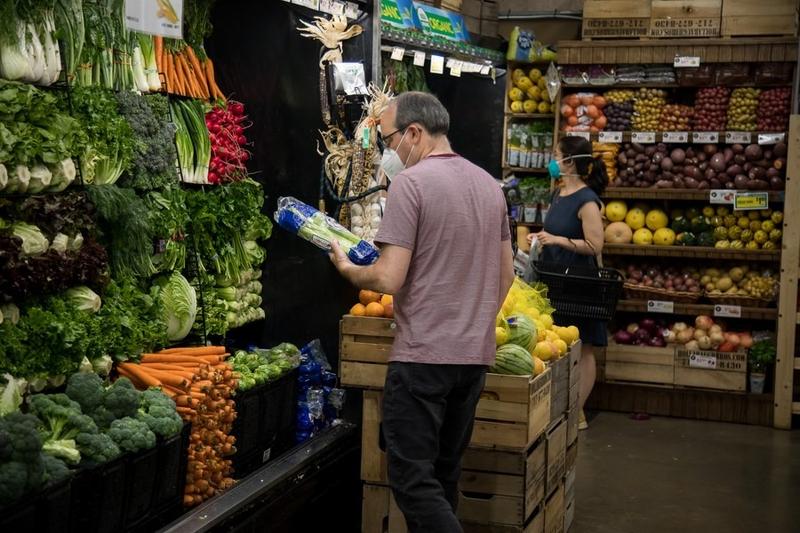 People shop at a grocery store in the Brooklyn borough of New York, US, on June 10, 2022. (MICHAEL NAGLE / XINHUA)
People shop at a grocery store in the Brooklyn borough of New York, US, on June 10, 2022. (MICHAEL NAGLE / XINHUA)
WASHINGTON — As the US Federal Reserve struggles to rein in the worst inflation in four decades, analysts fear the world’s largest economy is slipping into recession.
US consumer price inflation surged 9.1 percent over the 12 months to June, the fastest increase since November 1981, according to government data released on July 13.
Driven by record-high gasoline prices, the consumer price index jumped 1.3 percent in June, the Labor Department reported. The spike in inflation has diminished consumers’ confidence in the economy, sent President Joe Biden’s approval ratings tumbling, and poses a major political threat to Democrats in the November congressional elections.
Some economists believe that the United States economy is already in a recession, as two consecutive quarters of negative economic growth meet the technical definition. Others, meanwhile, argue that a recession might come a few months later.
The economy is estimated to have shrunk at an annual rate of 1.2 percent in the second quarter, according to the Federal Reserve Bank of Atlanta’s GDPNow model updated on July 8. First-quarter gross domestic product declined by 1.6 percent.
“We think we are in a recession,” investment guru and Ark Invest CEO Cathie Wood said in a recent interview with CNBC. “We think a big problem out there is inventories ... the increase of which I’ve never seen this large in my career.”
Citing Richard Kelly, head of global strategy at TD Securities, CNBC said, “The US economy could slip into a technical recession, defined as two consecutive quarters of negative growth, as soon as the end of the second quarter of 2022.”
According to the Institute for Supply Management, the US manufacturing sector saw slower growth in June amid continued supply chain bottlenecks and elevated inflation, with the Purchasing Managers’ Index standing at 53 percent, down 3.1 percentage points from the May reading.
“We are hearing from customers that their inventories are high, and sales are coming down. We expect orders to decline in the coming months until inventories are leveled properly against demand,” said a business executive from the apparel, leather and allied products industry.
“As the Atlanta Fed’s GDPNow estimates suggest, it is very possible that we will have a negative second-quarter GDP growth. That will make it two negative quarters in a row, which is the popular definition of a recession,” Desmond Lachman, senior fellow at the American Enterprise Institute and a former official at the International Monetary Fund, told Xinhua.
The US National Bureau of Economic Research’s definition emphasizes that a recession involves “a significant decline” in economic activity that is “spread across the economy” and “lasts more than a few months”.
Many economists believe that with high inflation and low unemployment, it is just a matter of time before the Fed’s more hawkish stance plunges the US economy into a recession despite a strong labor market showing in June.
“If they raise the projected terminal rate of this hiking cycle from around 3 percent to more than 4 percent, that indicates that they may need a recession to bring down inflation,” Peterson Institute for International Economics President Adam Posen said.
Lachman said: “I very much expect a recession. I think that the Fed is being too hawkish at a time when the economy is already slowing and when financial markets are in trouble.”
The so-called yield inversion — when the yield on two-year Treasury bonds exceeds the 10-year yields — has now happened again, Lachman said, noting that it is a very reliable forward indicator of a recession.
The US economy will tip into a recession next year, according to nearly 70 percent of leading academic economists polled by the Financial Times, in partnership with the Initiative on Global Markets at the University of Chicago’s Booth School of Business.


